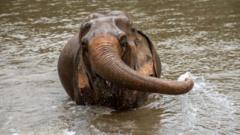A Spanish tourist was killed by an elephant during a bathing session at a Thai elephant care center, sparking discussions about the dangers and ethics of elephant tourism in the country.
Tragic Death of Spanish Tourist Highlights Risks of Elephant Tourism in Thailand

Tragic Death of Spanish Tourist Highlights Risks of Elephant Tourism in Thailand
A young woman's death raises concerns over the ethics and safety of tourist interactions with elephants in captivity.
In a shocking incident, a 22-year-old Spanish woman named Blanca Ojanguren García was gored to death by an elephant while bathing the animal at the Koh Yao Elephant Care Centre in Thailand. This tragic event unfolded last Friday, and local authorities have indicated that the elephant may have acted out of panic. Reports suggest that the stress of constant interactions with tourists may have contributed to the elephant's behavior, prompting calls for a re-evaluation of tourist activities involving these majestic creatures.
García, who was studying law and international relations at the University of Navarra in Spain, was in Thailand on a short trip with her boyfriend, who unfortunately witnessed the horrific event. In response to the tragedy, Spain's Foreign Minister José Manuel Albares stated that the Spanish consulate in Bangkok is providing assistance to García’s grieving family.
This incident sheds light on the contentious practice of bathing elephants, which is widely known among tourists in Thailand. The country boasts a population of over 4,000 wild elephants alongside a similar number kept in captivity, as per the Department of National Parks. At Koh Yao, tourists can purchase "elephant care" packages, which offer experiences like feeding, bathing, and walking with elephants, priced at around 1,900 to 2,900 baht (approximately $55 to $84).
Despite their popularity, these activities have faced criticism from animal rights activists, who argue that they place significant stress on elephants and interfere with their natural behaviors. Organizations like World Animal Protection have long highlighted that a majority of elephants used in tourism across Asia live under severely inadequate conditions. They emphasize that elephants are complex, intelligent creatures capable of experiencing deep emotional suffering, which is exacerbated by their captivity and forced interactions with humans.
The tragic death of García brings to light the urgent need for comprehensive reforms in the treatment of captive elephants in tourist settings, as well as a reassessment of the ethics surrounding elephant tourism in Thailand and beyond. As the conversation continues, it is essential to consider the well-being of these animals and the potential dangers of human-animal interactions.
García, who was studying law and international relations at the University of Navarra in Spain, was in Thailand on a short trip with her boyfriend, who unfortunately witnessed the horrific event. In response to the tragedy, Spain's Foreign Minister José Manuel Albares stated that the Spanish consulate in Bangkok is providing assistance to García’s grieving family.
This incident sheds light on the contentious practice of bathing elephants, which is widely known among tourists in Thailand. The country boasts a population of over 4,000 wild elephants alongside a similar number kept in captivity, as per the Department of National Parks. At Koh Yao, tourists can purchase "elephant care" packages, which offer experiences like feeding, bathing, and walking with elephants, priced at around 1,900 to 2,900 baht (approximately $55 to $84).
Despite their popularity, these activities have faced criticism from animal rights activists, who argue that they place significant stress on elephants and interfere with their natural behaviors. Organizations like World Animal Protection have long highlighted that a majority of elephants used in tourism across Asia live under severely inadequate conditions. They emphasize that elephants are complex, intelligent creatures capable of experiencing deep emotional suffering, which is exacerbated by their captivity and forced interactions with humans.
The tragic death of García brings to light the urgent need for comprehensive reforms in the treatment of captive elephants in tourist settings, as well as a reassessment of the ethics surrounding elephant tourism in Thailand and beyond. As the conversation continues, it is essential to consider the well-being of these animals and the potential dangers of human-animal interactions.

















